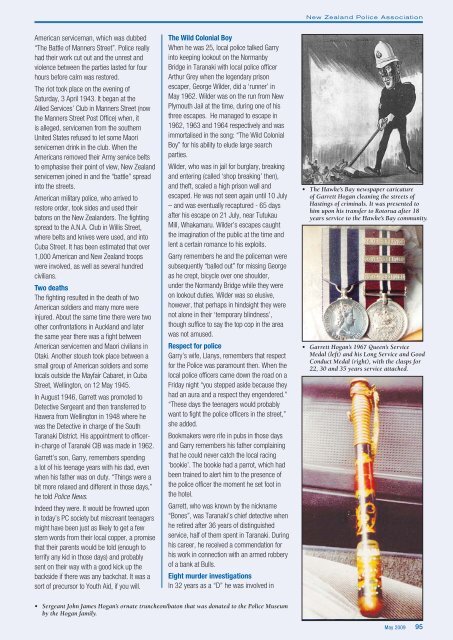Police News May 09.indd - New Zealand Police Association
Police News May 09.indd - New Zealand Police Association
Police News May 09.indd - New Zealand Police Association
Create successful ePaper yourself
Turn your PDF publications into a flip-book with our unique Google optimized e-Paper software.
<strong>New</strong> <strong>Zealand</strong> <strong>Police</strong> <strong>Association</strong>American serviceman, which was dubbed“The Battle of Manners Street”. <strong>Police</strong> reallyhad their work cut out and the unrest andviolence between the parties lasted for fourhours before calm was restored.The riot took place on the evening ofSaturday, 3 April 1943. It began at theAllied Services’ Club in Manners Street (nowthe Manners Street Post Office) when, itis alleged, servicemen from the southernUnited States refused to let some Maoriservicemen drink in the club. When theAmericans removed their Army service beltsto emphasise their point of view, <strong>New</strong> <strong>Zealand</strong>servicemen joined in and the “battle” spreadinto the streets.American military police, who arrived torestore order, took sides and used theirbatons on the <strong>New</strong> <strong>Zealand</strong>ers. The fightingspread to the A.N.A. Club in Willis Street,where belts and knives were used, and intoCuba Street. It has been estimated that over1,000 American and <strong>New</strong> <strong>Zealand</strong> troopswere involved, as well as several hundredcivilians.Two deathsThe fighting resulted in the death of twoAmerican soldiers and many more wereinjured. About the same time there were twoother confrontations in Auckland and laterthe same year there was a fight betweenAmerican servicemen and Maori civilians inOtaki. Another stoush took place between asmall group of American soldiers and somelocals outside the <strong>May</strong>fair Cabaret, in CubaStreet, Wellington, on 12 <strong>May</strong> 1945.In August 1946, Garrett was promoted toDetective Sergeant and then transferred toHawera from Wellington in 1948 where hewas the Detective in charge of the SouthTaranaki District. His appointment to officerin-chargeof Taranaki CIB was made in 1962.Garrett’s son, Garry, remembers spendinga lot of his teenage years with his dad, evenwhen his father was on duty. “Things were abit more relaxed and different in those days,”he told <strong>Police</strong> <strong><strong>New</strong>s</strong>.Indeed they were. It would be frowned uponin today’s PC society but miscreant teenagersmight have been just as likely to get a fewstern words from their local copper, a promisethat their parents would be told (enough toterrify any kid in those days) and probablysent on their way with a good kick up thebackside if there was any backchat. It was asort of precursor to Youth Aid, if you will.The Wild Colonial BoyWhen he was 25, local police talked Garryinto keeping lookout on the NormanbyBridge in Taranaki with local police officerArthur Grey when the legendary prisonescaper, George Wilder, did a ‘runner’ in<strong>May</strong> 1962. Wilder was on the run from <strong>New</strong>Plymouth Jail at the time, during one of histhree escapes. He managed to escape in1962, 1963 and 1964 respectively and wasimmortalised in the song: “The Wild ColonialBoy” for his ability to elude large searchparties.Wilder, who was in jail for burglary, breakingand entering (called ‘shop breaking’ then),and theft, scaled a high prison wall andescaped. He was not seen again until 10 July– and was eventually recaptured - 65 daysafter his escape on 21 July, near TutukauMill, Whakamaru. Wilder’s escapes caughtthe imagination of the public at the time andlent a certain romance to his exploits.Garry remembers he and the policeman weresubsequently “balled out” for missing Georgeas he crept, bicycle over one shoulder,under the Normandy Bridge while they wereon lookout duties. Wilder was so elusive,however, that perhaps in hindsight they werenot alone in their ‘temporary blindness’,though suffice to say the top cop in the areawas not amused.Respect for policeGarry’s wife, Llanys, remembers that respectfor the <strong>Police</strong> was paramount then. When thelocal police officers came down the road on aFriday night “you stepped aside because theyhad an aura and a respect they engendered.”“These days the teenagers would probablywant to fight the police officers in the street,”she added.Bookmakers were rife in pubs in those daysand Garry remembers his father complainingthat he could never catch the local racing‘bookie’. The bookie had a parrot, which hadbeen trained to alert him to the presence ofthe police officer the moment he set foot inthe hotel.Garrett, who was known by the nickname“Bones”, was Taranaki’s chief detective whenhe retired after 36 years of distinguishedservice, half of them spent in Taranaki. Duringhis career, he received a commendation forhis work in connection with an armed robberyof a bank at Bulls.Eight murder investigationsIn 32 years as a “D” he was involved in• The Hawke’s Bay newspaper caricatureof Garrett Hogan cleaning the streets ofHastings of criminals. It was presented tohim upon his transfer to Rotorua after 18years service to the Hawke’s Bay community.• Garrett Hogan’s 1967 Queen’s ServiceMedal (left) and his Long Service and GoodConduct Medal (right), with the clasps for22, 30 and 35 years service attached.• Sergeant John James Hogan’s ornate truncheon/baton that was donated to the <strong>Police</strong> Museumby the Hogan family.<strong>May</strong> 200995

















